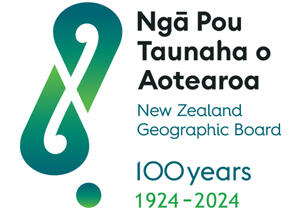Countries have the right to name places and features in their territories, in line with their own laws, policies and guidelines. Globally, naming practices differ but the international community of naming authorities work together to maintain agreed standards and worldwide consistency for place names.
United Nations Group of Experts on Geographical Names
The United Nations established the United Nations Group of Experts on Geographical Names (UNGEGN) in 1967 to help manage worldwide uncertainty about the spelling of place names. UNGEGN considers issues affecting the standardisation of place names and makes decisions and recommendations for adoption by Member States. We represent New Zealand’s interests as a Member State of UNGEGN.
Find out more about The United Nations Group of Experts on Geographic Names
Australia and New Zealand Working Group on Place Names
The aim of the Australia and New Zealand Working Group on Place Names (ANZWGPN) is to standardise place names across our countries and provide governance around the processes for deciding on place names.
Our Secretary is a member of ANZWGPN, which also includes members from federal, state, territory and defence/navy naming authorities in Australia. Our membership provides an opportunity for us to effectively share information and knowledge relevant to our own place naming responsibilities.
Find out more about the Australia and New Zealand Working Group on Place Names
Sub-Committee on Undersea Feature Names
The Sub-Committee on Undersea Feature Names (SCUFN) is a committee under the General Bathymetric Chart of the Oceans (GEBCO). SCUFN establishes naming guidelines and selects undersea feature names and encourages their use on charts and maps.
Once we have made an undersea feature name outside of New Zealand’s 12 nautical mile limit official, we submit it to SCUFN for consideration and inclusion in its Gazetteer.
Search the GEBCO Undersea Feature Names Gazetteer
In keeping with SCUFN’s guidelines we have a protocol for undersea feature naming, which encourages national naming authorities to consult with us for any undersea feature names proposed within our naming jurisdiction.
See IHO’s B-6 on the Standardisation of Undersea Feature Names
Find out more about the Sub-Committee on Undersea Feature Names
United States Advisory Committee on Antarctic Names
The United States gives names to features over the whole of Antarctica including within New Zealand’s area of interest in the Ross Sea region. We liaise with the United States Advisory Committee on Antarctic Names (US-ACAN), who advise the United States Board on Geographic Names (USBGN).
Find out more about the United States’ policies on Antarctic names
Find out more about the United States Advisory Committee on Antarctic Names
We also liaise with other nations operating or naming features within New Zealand’s area of interest in Antarctica, for example, Italy’s Programma Nazionale di Ricerche in Antartide, and the Australian Antarctic Division.
The Scientific Committee on Antarctic Research
The Scientific Committee on Antarctic Research (SCAR) advises on scientific matters relating to the 1959 Antarctic Treaty, which New Zealand is a signatory to. SCAR’s Standing Committee on Antarctic Geographic Information (SCAGI) is responsible for collating place names in Antarctica and producing the Composite Gazetteer of Antarctica (CGA). All countries that have signed the Antarctic Treaty and who name features in Antarctica contribute to the CGA. Our Secretary and the Chair of our Antarctica Names Committee are members of SCAGI.
Search the Composite Gazetteer of Antarctica
Find out more about the Scientific Committee on Antarctic Research
Find out more about the Standing Committee on Antarctic Geographic Information
Find out more about SCAR’s International Principles and Procedures for Antarctic Place Names
